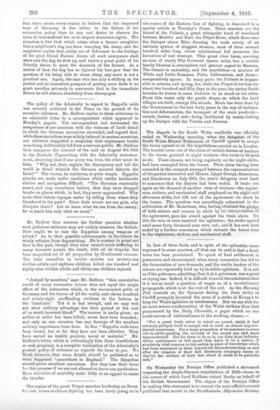The policy of the Admiralty in regard to Zeppelin raids
was recently criticized in the Times on the ground of its excessive reticence. Mr. Balfour replies to these criticisms in an admirable letter to a correspondent which appeared in Monday's papers. The correspondent had contrasted the meagreness of our accounts with the richness of lurid detail in which the German narratives abounded, and argued that, while these narratives were widely believed in neutral countries, our reticence suggested a suspicion that unpleasant truths were being deliberately hid from a nervous public. Mr. Balfour then compares the account of the raid on August 9th-10th in the Deutsche Tageszeituny with the Admiralty announce- ment, observing that if one story was true, the other must be false. " Why not, then, explain the discrepancy and tell the world in detail wherein the German account distorts the facts ? " The reason, he continues, is quite simple. Zeppelin attacks aro made under conditions which render landmarks elusive and navigation difficult. "The Germane constantly assert, and may sometimes believe, that they have dropped bombs on places which, in fact, they never approached. Why make their future voyages easier by telling them where they blundered in the past I' Since their errors are our gain, why dissipate them ? Let us learn what we can from the enemy; let us teach him only what we must."


































 Previous page
Previous page